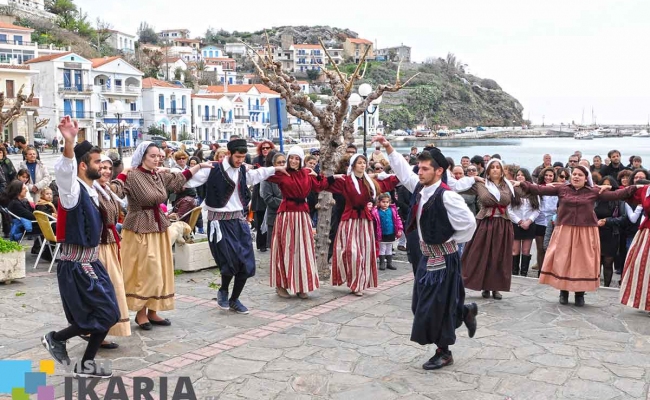The Ikarian traditions are the take it easy beahavior, Christmas and Easter customs.
Night opening
This custom is found mainly in the North side of the island, near the village Raches. The shops open at night and stay open even after midnight (overnight). The main reason why this happens, is that it has its roots in the years before the Turks, the time of the piracy. At that time, the inhabitants of the island, apart from the fact that they made their homes in places that were not visible from the sea, so that the island seems uninhabited and hence not bothered by pirates, residents tended to move more or only during the night so as not to be perceived by the sea.
Another reason is that in the morning, people was working the land and the evening they could open their shops. While in the past, this was happening for social reasons and reasons of survival, now is only a touristic custom.
Ikarian Appointment
Ikarians take it easy!Anxiety is not for Ikarians!In Ikarian appointment, when some people have an appointment for some reason at a certain time (usually for coffee, food and general fun and not for health reasons), the meeting is almost always late which in some cases reaches and two hours of delay! The reason for this " custom" is that many years ago, because the distances were great (and lack of transportation and road), moving a person from one place to another lasted several hours. Another reason is that Ikarians are not stressed with anything.
Also, the old days everyone worked until late in the evening and waited to meet with their fellow villagers, after the end of each job. This custom tends to disappear nowadays, but is kept mainly at weddings, where the bride wont sets the groom in some cases in excess of one hour and also friends of the groom are teasing him (usually by concealing clothes or soiling with flour and various others) and so marriage is too late.
Christmas and New Year
On the New Year’s day, almost all villages of the island, start from the morning to go to each house and say Ikarian Carols. The housekeepers treat their " guests " with wine, food and then leave together and go to other houses in the village (in as much as they can). Since groups are created, usually some take their musical instruments together (violin and bouzouki) and illuminates more fun.
Easter
The hour of Resurrection in every village, together with the dropping of various firecrackers at a central point and usually near the church, people burn twigs and wood in a stack which is called Soros, who have gathered the previous days. Each village creates its own soros and locals compete on who would make the best bunch and bigger, that will burn much longer. A variation of this custom, is made in Karavostamo and is called Afanos.
When it is windy and weather conditions do not permit, soros is lit the next or the subsequent day of the Resurrection.
Antilambra
Antilambra is a custom, is a custom that is found in many villages, the day of Easter. When one village burns Soros, the other makes Antilambra. On Easter day, the villages Glaredo and Christos and prepare an effigy of Judas, which they call it 'Tsifouti'. After they prepare the dummy in one of the houses, they parade him in other nearby villages and when they return, they tie him and hang him in a central location. At the same time, in the church and after the divine service, accompanied by fireworks, they burn the effigy.
Carnival
The Carnival has pre-Christian origins and marks the end of the meat-eating and the beginning of fasting Easter.
The first week of Carnival ends on the Sunday of the Prodigal Son ('Asotos'), also called 'Profonousimi' or 'Absolute'. The second week is called Creatine or meat eaters, because they ate meat and did not fast either Wednesday nor Friday. Thursday of this week is the Pancake Day ('Tsiknopempti'), which is customary in Ikaria, but also throughout Greece, consumed plenty of meat. The Sunday of that week, is called the Sunday of Carnival and the entire period of the Triodion entrance until Shrove Monday ('Kathara Deftera') , so named because it is customary not to eat meat and "to abstain from meat." The third week is called casein or Shrovetide , because eating dairy products like intermediate state between meat-eating and fasting to prepare for the great Lent (40 days before Easter). Analogous to the Greek word Carnival is the Latin word Carnival (Carneval, Carnevale, the words Carne = meat and Vale = pass).
The Carnival corresponds to the Roman Saturnalia, in honor of the god Saturn (patron of sowing) and have their roots in the ancient Roman Lupercalia. Probably the carnival is associated with the Dionysian festivals of the ancient Greeks and in Ikaria after considered as a possible birthplace of the god Dionysus, are organized in recent years, a series of events, reviving old customs, such as ''the tragomorfoi and koudounatoi''. According to tradition , the carnival was conducted in February, in honor of the Lamp ('Fanos') who was the protector of flocks from the wolves, with festivals of purification to ensure the fecundity and fertility of the Earth and preserving the flock. As part of that celebration, the priests sacrificed goats and then they dressed with their skins and roamed the city. Something similar, is organized in Ikaria, where masqueraders, wear hides, bells and dance around a 'purifying' fire, rousing the world gathered around.
The last week before and during Shrove Monday, events throughout Ikaria take place with traditional music and dances from various clubs and a parade with chariots and masquerades of students.Various games for younger are organized, such as kite flying, dancing, treasure hunt, clowns, confectionary and much more... You will definitely have a lot of fun, while teasing and joking are not missing!









